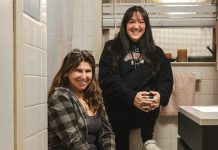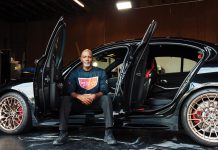
Photograph by Johnathon Kelso
Atlantans is a first-person account of the familiar strangers who make the city tick. This month’s is Mike Idacavage, a longtime Peachtree Road Race volunteer, as told to Thomas Wheatley.
I moved to East Cobb from San Diego in 1996, just before the Olympics, to lead the global research and development department of a chemical company. I volunteered at my first Peachtree in 1997, and it was love at first sight. I arrived at 5 a.m. Volunteers were upbeat. I thought, Wow, you guys are really excited being up this early and without coffee. The spectators arrive; the runners pass by—the excitement and the energy. On race day, you rarely see a down face. It’s a celebration of life. It’s pretty easy to be upbeat.
I had kind of a funny introduction to running. When I was getting my PhD at the New York State University College of Environmental Science and Forestry in Syracuse, I participated in a research project measuring the endurance of nonrunners. When you’re a student, you’re not very well off—you never know where you’ll get your next pizza money or beer money—so I signed up because it paid. I started running on a treadmill, and I just kept going. I started running the hills of Syracuse. The solitude, the time to focus and just go—that’s pretty cool. I thought about science and enjoyed the birds, the sun, whatever was around me. It wasn’t that difficult to get the miles in. Now, most of my involvement in running is focused on the volunteering part.
For the past six or seven years, I’ve been responsible for the hydration stations for the entire six miles of the race. I’m a firm believer in being everywhere at the same time, so I’m running everywhere. I have 14 or 15 team leaders along the route who have 30 or 40 people working with them. In total, I can be responsible for roughly 450 people. It’s a ballet. Things happen within minutes or seconds of each other, and you’re creating a seamless experience for the runner and the audience. And when you pull it off, it’s the biggest adrenaline rush. I managed seven different technical labs in seven different countries at the same time, so I’ve had a little bit of training. I am much more tired at the end of the day than I would be if I ran.
I’m a scientist. If you’ve been to a dentist in the past 20 years and you got a filling, and they put a soft material in your tooth and exposed it to a blue or red light, that’s the chemical reaction I teach courses about at Syracuse University. Now, I am semiretired, and I consult with companies. I wrote a book with a Nobel prize winner. In the early 1980s, I went through the process to become an astronaut candidate. I’ve given lectures at Nike, Ford, and other companies. I like to stay busy.
On race days, the energy level goes up, and I’m in constant motion. I’m talking, laughing, celebrating, giving people high-fives. When an emergency happens—that’s very rare—you switch to “let’s solve it.” During an average Peachtree, we give out 450,000 cups of water. Immediately when the streets close for the race, 90 minutes before the runners take off, two trucks with water, tables, cups, and other equipment roll out to set up. One year, one of the trucks with 50 percent of our water supplies for 65,000 runners broke down. We dispatched a mechanic to move it and finished unloading all the water, two blocks away from the race leaders. No one noticed. It summed up everything about volunteering: working together with people, dealing with problems, having a plan B, C, and D.
Last year, the road race was virtual and was held on Thanksgiving rather than in July. This year, we’re holding the race over two days. We have a cool challenge: provide the same experience over two days, making sure volunteers, runners, and the audience are safe, and tackling all the logistical issues. I can’t wait to celebrate when we have both races under our belt and say, We did it.
It’s a rush to volunteer. I’d have a hard time not doing it. I volunteered at the Super Bowl. I would have been at the Final Four until it got canceled because of Covid. The primary reason I volunteer is the people. The runner who fell down and injured his knee and I helped him. I got to plant a tree with NFL players. These aren’t things I’d get to do in my everyday life. I’m doing something for the greater good. I’m amazed how many times I’ve met people, and we find mutual friends or connections. You appreciate how small we are, globally. In general, everyone should get past their envelope of who they are as individuals and get out there and experience it. Besides, it’s a helluva lot more fun.
This article appears in our July 2021 issue.













